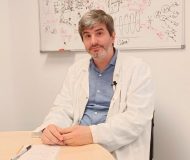

The Research Institute of the Santa Creu i Sant Pau Hospital – IIB Sant Pau will begin the first phase II clinical trial with an active vaccine against the amyloid protein, a key factor in the onset of Alzheimer’s.
Sant Pau is a leading center in the care of people with DS: it has the only Alzheimer-Down Unit in Spain, specialized in the diagnosis, care and clinical and translational research of this disease neurodegenerative and which, coinciding with its tenth anniversary, has reached a thousand people treated. On the occasion of World Down Syndrome Day, a genetic alteration caused by the presence of an extra copy of chromosome 21, Sant Pau experts explain the main novelties and future challenges.
In recent years, the life expectancy of people with DS has increased significantly, which has meant that today 70% of deaths in this population group are caused by Alzheimer’s. “These people have a much higher risk of suffering from the disease. When they reach the age of 40, 100% present the characteristic biological changes of Alzheimer’s in the brain and the average age of development of the disease is 54 years”, explains Dr. Juan Fortea, head of the Alzheimer-Down Unit in Sant Pau and director of the Neurological Diseases, Neuroscience and Mental Health Area of the Research Institute of the Hospital de la Santa Creu i Sant Pau – IIB Sant Pau. “Many advances have been made in recent years, especially in inclusion, but the association with Alzheimer’s is a huge obstacle, because it is an incurable pathology today and with a poor prognosis.”
The Alzheimer-Down Unit has launched a pioneering plan for population-based screening of Alzheimer’s disease in adults with DS by evaluating one of the largest cohorts in the world, with multimodal studies of Alzheimer’s biomarkers. “The health plan, which has been in operation since 2014 coinciding with the launch of the Unit, carries out active screening among all people with DS, from the age of 35, which consists of visits to Neurology, Neuropsychology and Nursing as at least once a year, because we know that from this age they already have the amyloid protein in the brain”, explains Dr. Fortea.
“When these people have already developed the symptoms, the visits are six-monthly or as often as necessary.”
In recent years, a lot of work has been done to try to understand the relationship between DS and Alzheimer’s disease. “It has been a period where we have had many successes in Sant Pau, with many publications of great impact, and we have contributed to promoting this research at a global level, but now the main objective, which is really to modify the evolution of the pathology with new treatments”, in the words of Dr. Fortea.
Advances in the knowledge of the biological bases of Alzheimer’s disease have allowed researchers to have biomarkers in recent years, “which has put us in a much more favorable situation, where we can now consider doing clinical trials with new treatments”, says the doctor.
Alzheimer’s disease, in general, is experiencing a paradigm shift. At the end of last year, the results of the first “clearly positive” clinical trial that slowed down the evolution of the pathology were published. “And, precisely, it is an anti-amyloid therapy”, says Dr. Fort. He adds that “if in any population it makes sense to give anti-amyloid therapies, it is in the Down Syndrome population”.
People with DS develop Alzheimer’s due to an alteration in the amyloid precursor protein. “They generate more of this protein. And, according to the amyloid cascade theory, this triggers a series of events that ultimately result in neuronal loss, cognitive impairment and dementia”. This represents an opportunity for this population, because “it opens up a completely new horizon”, according to the expert. Now one of the main objectives is to find how to implement this therapeutic strategy in the safest possible way, minimizing possible adverse effects.
IIB Sant Pau is about to start the first phase II clinical trial with an active vaccine against amyloid in patients with DS. In the coming months, the first patients will begin to be recruited, according to Dr. Fortea. Researchers are aware that it is possible that people with DS may be at higher risk, as they are also a vulnerable population. “But the relationship between risk and benefit must be kept in mind, as it is one of the main health problems in this population. We estimate that up to 70% of deaths in adults with DS are caused by Alzheimer’s disease. That is the magnitude of the problem. The figures are terrifying, but for the first time we can imagine, in a reasonable way, a future where we can contribute to changing them”.